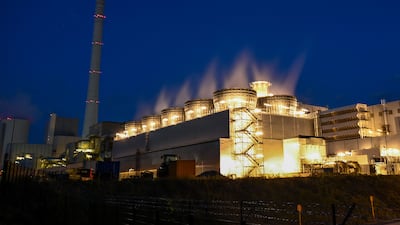The EU faces growing pressure to put a cap on energy prices after several countries came out in favour and Germany appeared to soften its opposition.
An emergency summit in Prague next week will hear proposals to intervene in the energy market after Russian gas cuts left households facing rising bills.
German Economy Minister Robert Habeck, who previously opposed a blanket price cap, told his EU colleagues in a text leaked to Italian media that he was now open to the idea.
The developments came after European Commission president Ursula von der Leyen said plans were being drawn up for an “emergency intervention” to stop high gas prices from driving up electricity costs.
She joined a chorus of politicians who complained that Europe's electricity market was flawed because gas often dictated the cost of electricity even when renewable sources would be cheaper.
Russia's gas cuts deepened on Tuesday as French importer Engie said its deliveries from Russian energy company Gazprom were being halted due to a disagreement.
Even countries and importers who do not directly import Russian gas are exposed to the crisis because the squeeze across Europe means prices will be high everywhere.
Among those calling for a freeze are Belgian Energy Minister Tinne Van der Straeten, who said five to 10 “terrible winters” were looming if nothing was done.
Austrian Chancellor Karl Nehammer said power costs should be capped because the present system allowed “Putin to decide the European electricity price every day”.
Spain and Portugal, who are largely cut off from the rest of the European power grid, won special permission from the European Council in March to cap electricity prices at home.
Germany and the Netherlands are among the countries that have expressed scepticism in the past, with Mr Habeck saying in July that the state could not simply absorb the cost of the energy squeeze.
However, the Spanish government will use the September 9 meeting in Prague to appeal for the Iberian policy to be extended across Europe, newspaper El Pais reported.

German Chancellor Olaf Scholz would not be drawn on the possibility on Monday but said various possibilities were being looked at.
Czech Industry Minister Jozef Sikela said market interventions by states or even the European Central Bank were being considered.
“The main task … is to separate the price of electricity from the price of gas, and thus prevent Putin from dictating to Europe prices of electricity with his shenanigans with gas supplies,” Mr Sikela said.
“What is going on is really a pan-European problem. The best solution is a Europe-wide solution,” he said.
The G7 countries are exploring the possibility of separately setting a price cap on Russian oil and gas by forming a buyer's cartel that would refuse to insure shipping if its cargo is too expensive.


